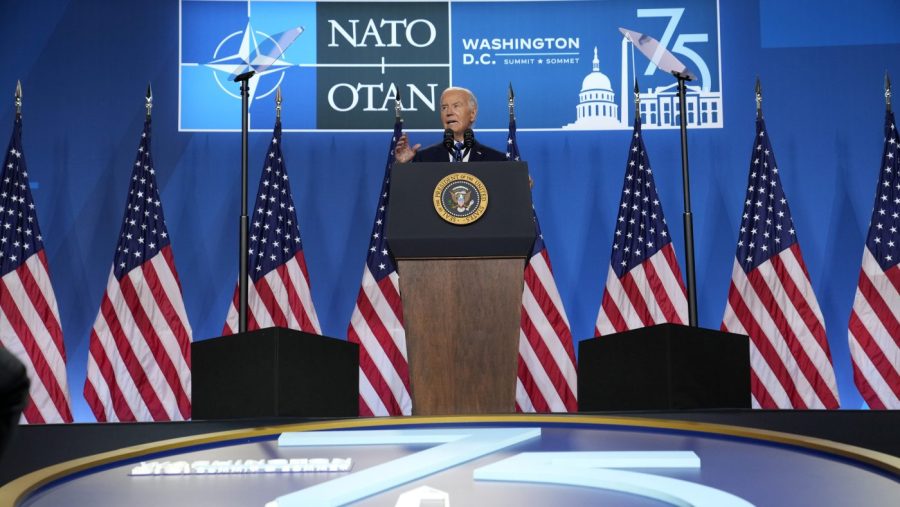A growing number of Democratic lawmakers are calling on President Joe Biden to drop his re-election bid but so far he has remained adamant about staying in the race.
The Democratic National Convention is one month away and a virtual roll call is set to happen even sooner. Meanwhile, the 81-year-old Biden is currently running 2.5 points behind former President Donald Trump.
If the president does withdraw from the ticket, it would set off a chaotic few weeks as Democrats decide how best to move forward. Here’s what that process could look like.
How would replacing Biden work?
Scenario #1 — Biden drops out before being formally nominated
If Biden willingly steps aside before being officially nominated, his 3,896 pledged delegates would be free to vote for whomever they choose at the convention. At that point, Biden would no longer control the delegates, though he could endorse a successor, which may carry a lot of weight.
With Biden out, any remaining candidates would make their case to win over the delegates, who would then vote for the nominee at the convention. To win the nomination, a candidate needs to earn support from the majority of delegates.
There’s also a chance Democrats rally around a candidate before the convention, in which case, a free-for-all contested convention would not come to pass. Biden’s delegates would simply back the new nominee when it comes time to vote.
Depending on when Biden withdraws, Democrats could host a mini-primary before the convention which would likely mean a campaign blitz between potential replacements, complete with town halls, speeches and debates.
Scenario #2 — Biden drops out after being formally nominated
If Biden withdraws after becoming the official nominee, the party rules are fairly clear — the Democratic National Committee (DNC) would fill the vacancy. That decision would be made after discussions with Democratic leadership in Congress and the Democratic Governors Association.
There are several reasons why waiting until after the convention would be a headache for Democrats. For one, the party would be up against state filing deadlines which require both parties to submit their chosen candidates by a certain time. On top of that, waiting to drop out cuts the campaign time for Biden’s replacement.
Scenario #3 — Democrats replace Biden without his approval
Removing Biden through a hostile takeover would be unprecedented in modern times. Technically, Biden’s delegates aren’t required to support him at the convention even though they are “pledged” to him.
DNC rules say, “All delegates to the National Convention pledged to a presidential candidate shall in all good conscience reflect the sentiments of those who elected them.” In other words, delegates could go their own way under the “good conscience” rule.
The Associated Press explains why that’s highly unlikely: “the candidate has the right to review and make changes to their slate of delegates in each state, ensuring that delegate slots are filled by supporters loyal to them.”
How would the running mate be decided?
If Vice President Kamala Harris or someone else were to become the nominee, they would choose their running mate, not the party. However, whoever they select would still need to win the delegates’ support.
Harris is the most obvious successor should Biden withdraw but it’s not clear who would join her on the ticket.
Potential options include a host of popular Democratic governors including Kentucky Gov. Andy Beshear, Pennsylvania Gov. Josh Shapiro, Illinois Gov. JB Pritzker, Michigan Gov. Gretchen Whitmer or California Gov. Gavin Newsom.
Those state leaders could also launch bids of their own if they choose to.
What’s the timeline?
The Democratic National Convention opens in Chicago on Aug. 19. That event is typically when the party formalizes its nominee but this year is set to look different.
Democrats are planning to officially nominate Biden during a “virtual roll call” before the convention in order to work around Ohio’s filing deadline which was Aug. 7 but was later extended to Aug. 31.
As of right now, the DNC is still working to finalize a plan to compress its “virtual roll call” into the first few days of August, Axios reported Thursday.
In the meantime, the DNC may decide to switch gears and forego the virtual roll call, ultimately finalizing the nominee at the convention.
What would happen to the Biden-Harris campaign money?
There’s some uncertainty about what would happen to the Biden campaign’s $91 million in the bank if he were to drop out of the race. It may depend on who his replacement is.
If the candidate is Harris, or she becomes someone else’s running mate, then the new ticket would maintain access to the funds, Saurav Ghosh, a lawyer at the Campaign Legal Center, told Reuters.
However, that transition could face legal challenges, especially if Biden drops out before he’s formally nominated.
If neither Biden nor Harris appear on the ticket, the campaign would have to give almost all of the money back, Kenneth Gross, senior political law counsel at Akin Gump, told the Associated Press.
At that point, the Biden-Harris campaign could designate the funds for a super PAC or the party itself. If that happened, it would come at a cost, in part, because television advertising rates are higher for parties than for candidates.
The Associated Press contributed to this report.
